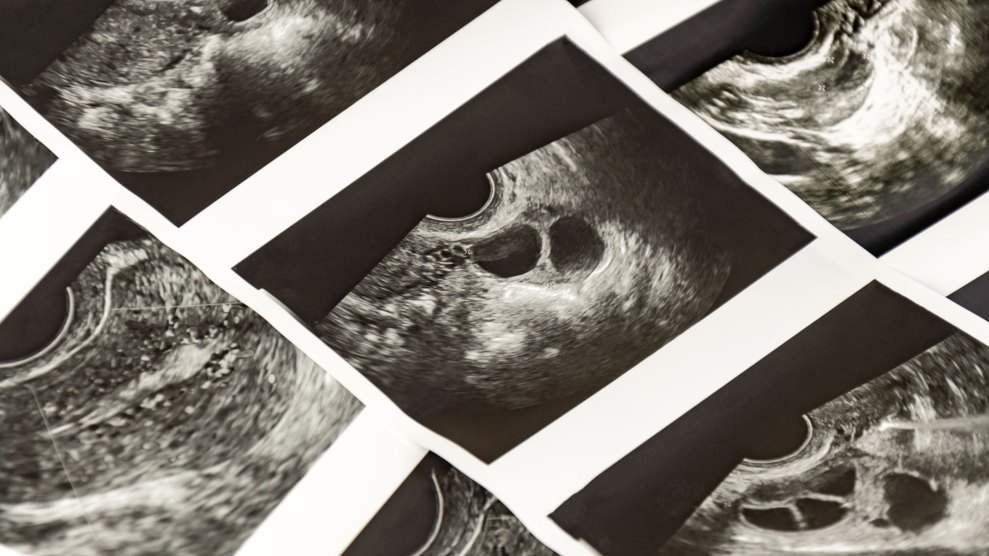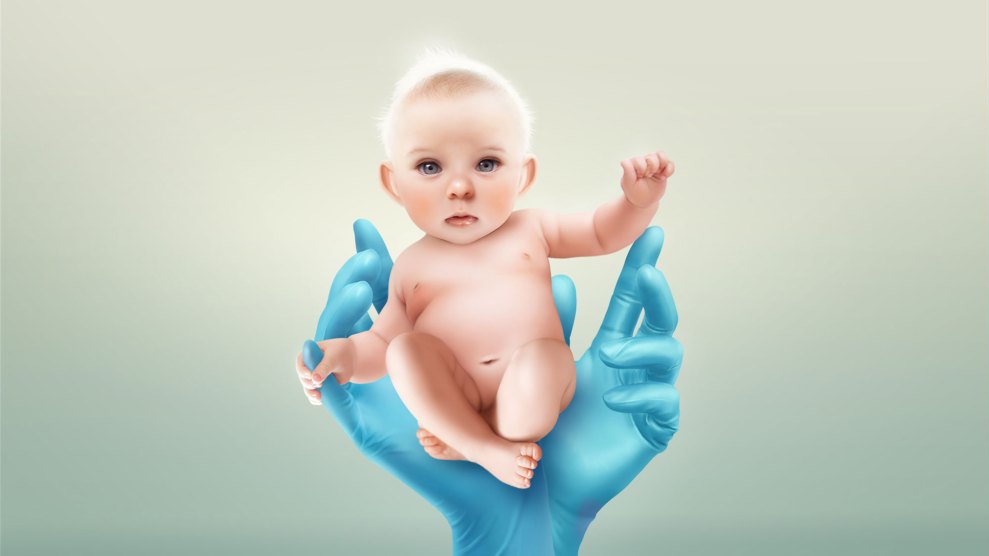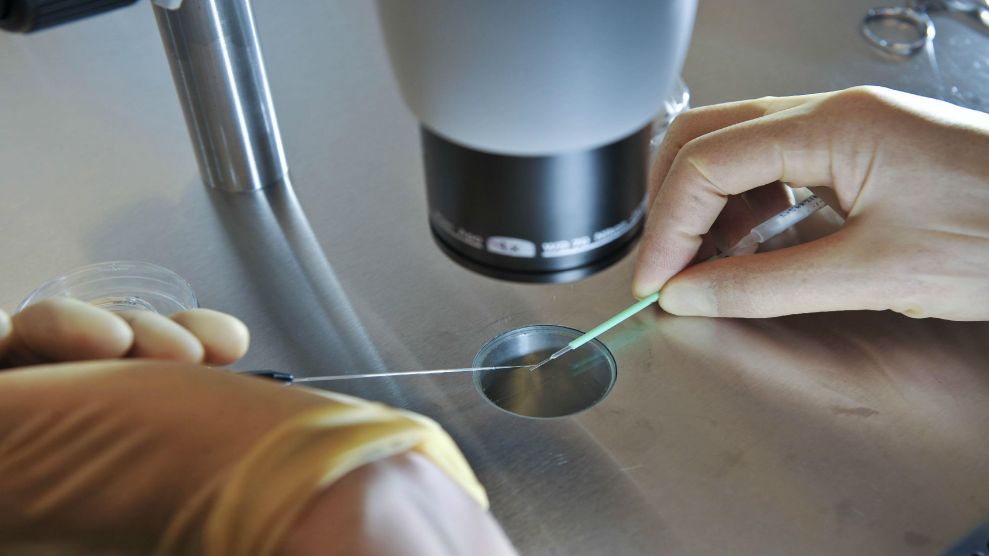
September15/iStock
Update, November 28, 2018: At an international conference on human gene editing held in Hong Kong Wednesday, He apologized for the lack of transparency in his research, saying the results were “leaked” early, and that he didn’t expect the backlash from the public. The research, he assured a tense crowd, has been submitted to a journal for review. Although his study, which originally included eight couples, has since been put on pause, one additional couple is in the very early phase of a pregnancy. He said he was “proud” of his work.
On Sunday, Chinese researcher He Jiankui posted a YouTube video in which he made a historic claim: The first-ever gene-edited babies were born a few weeks ago in China, “as healthy as any other babies,” he said. The babies, twin girls named Lulu and Nana, were just like any other baby fertilized in vitro, except that their DNA had undergone a genetic “surgery” while the two were embryos, using a technology called CRISPR-Cas9. He says the modifications were intended to make the babies resistant to HIV.
Although gene-editing technologies like CRISPR have been used to alter DNA in adults and children with genetic disorders, this would be the first time anyone has claimed to use gene-editing technology to change human DNA in a baby carried to term. Many countries, including the United States, have banned the practice but as journalist Rowan Jacobsen pointed out in a story for Mother Jones last year, “Research continues around the world, and the lack of regulation in some countries means that anyone who wants to escape the rules can do so.”
“I believe this is going to help the families and their children,” He, a researcher at Southern University of Science and Technology of China in Shenzhen, told the Associated Press on Monday. If his actions are later found to have caused unwanted side effects or harm, “I would feel the same pain as they do and it’s going to be my own responsibility.”
The internet and the scientific community exploded in outrage in response to He’s claims. Researchers called the move “unconscionable” and “very dangerous.” China has issued ethical guidelines against implanting gene-edited embryos, but it has no official ban on the books. On Tuesday, the Chinese National Health Commission announced an investigation into the claims after the hospital in which the research was supposed to have taken place said it never happened. “We can ensure that the research wasn’t conducted in our hospital nor were the babies born here,” a hospital representative told CNN. He’s university said in a statement that the institution was unaware of the research and that He had been on leave since early 2018.
To make sense of this fraught story, I called Fyodor Urnov, a genetic scientist and deputy director of the Altius Institute for Biomedical Sciences, a biomedical nonprofit research organization based in Seattle. One of the first researchers ever to use CRISPR, Urnov is named on more than 130 patents relevant to gene editing. We talked about He’s supposed achievement—and what it means for science, ethics, and evolution.
Mother Jones: Let’s start with the basics. What is CRISPR?
Fyodor Urnov: CRISPR, as a technology, is very broad. It’s a way to change DNA in a cell. Human cells or mice cells or cow cells have been genetically engineered using CRISPR. Basically, it is a little set of molecular scissors and you can program them to go inside a cell and and find a gene of interest on demand. There have been genetic-editing clinical trials for HIV, cancer, sickle cell disease, hemophilia. There soon will be clinical trials for blindness, for liver disease, you name it.
MJ: He Jiankui’s claims of genetically-modified babies seems to have taken the scientific community, and the public, by surprise. What was your first reaction when you heard about it?
FU: Today is historic because we have entered—I don’t really know what to call it. Is it a chapter? An age? Or a zone? There we go, it’s a zone! It’s a zone where we are purposefully modifying our children in a way that will affect the genetic constitution of their children as well. So this is historic, but it is also somber because the primary purpose of gene editing is to treat disease. What was done in China, assuming it was done, wasn’t really done to treat any existing disease. It was done to allegedly protect the children that hadn’t been born from hypothetical future infection by HIV. This flies directly in the face of, and contradicts, all existing regulatory guidelines for human gene editing. And thus, frankly, I am disappointed.
More than anything, the shock is why? There was no medical need. What is he trying to achieve? There are other ways to get to the same outcome. If he was so concerned about HIV susceptibility of these children, well, once they are born, you can just gene edit their immune system and they would be HIV protected. We know that can be done. There was no reason to edit [the embryos], but that’s what he did.
The scientists who work on this are, frankly, mortified. We wanted a vigorous, thoughtful, and ethical deployment of gene editing and CRISPR for medical need for disease in adults and children—rather than embryos.
MJ: What is the concern? Is it that those modifications will be passed to the twins’ offspring?
FU: It is, but I think the more immediate concern is that somebody went ahead and basically flaunted years of rules and regulations that were put forward by the medical community that have thought about this very hard, in the United States and in Europe and in Asia. There is a moratorium on editing of embryos in this way to basically, you know, ensure we’ve given very hard thought on how to do this right. The question is, what other experiments of this type are currently at play? And whose labs? And for what purpose?
MJ: The first CRISPR baby would be a huge leap for science. Is it something researchers are competing to be the first to do?
FU: Embryo editing is such a delicate subject. I think people would hesitate to describe themselves as engaged in an overt race, but I suspect that there probably is an undercurrent of competitiveness because it is quite a technical achievement.
The thing He didn’t do, which really puzzles me, is that he could have taken this very CRISPR and tested it on adults and shown that it was safe. And he didn’t do that. And the reason I’m bringing this up in the context of your question of competitiveness is, it suggests to me a certain rush to action that I don’t understand.
MJ: Do you think gene editing is humans “playing God,” as some have called it, or is it just an extension of evolution—much like the invention of tools or medicines?
FU: Our DNA is not fixed. It changes in response to the world. (For example, folks of North European or West African ancestry can drink milk as adults. Folks of Chinese ancestry can’t. Their DNA is different. In parts of the world where the cow was domesticated, and people started drinking milk, their DNA changed.) So fundamentally speaking, there is nothing biologically unnatural about human DNA being changed.
I see the use of gene-editing to treat genetic disease as a natural continuation of the fact that human DNA has been changing since our species emerged. I don’t really see an antagonism between the “natural” and the technically artificial in this case. Genetic disease is not part of some master plan of evolution that is written into how the world needs to work. Genetic diseases are just a mistake. If Mother Nature had emotions, she’d probably be sorry, but she doesn’t have emotions. It’s just evolution. The fact that we have these remarkable tools to give us these abilities, I see as a cause for celebration—assuming we can put the technology to wise use, rather than the kinds of things we are seeing right now in China.














